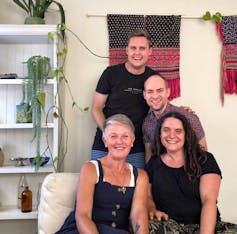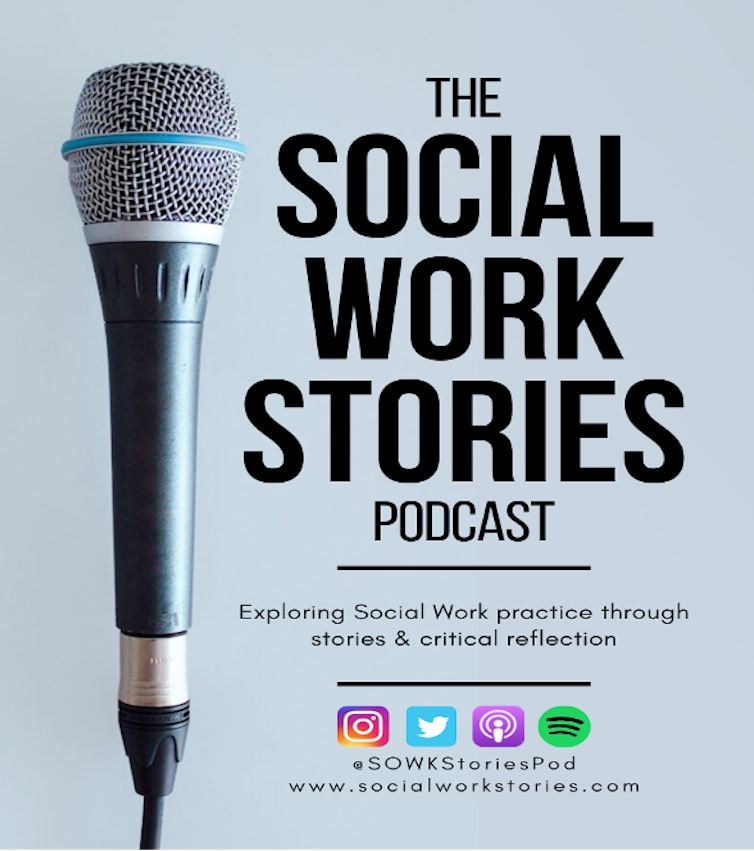Podcasting overcomes hurdles facing unis to immerse students in the world of workers' experiences
- Written by Mim Fox, Senior Lecturer in Social Work, University of Wollongong
Podcasting is helping to revolutionise tertiary education. Universities have found themselves caught between shrinking budgets and an official insistence that they make graduates job-ready. Academics have had to be creative and flexible about how they engage their students with crucial learning, and podcasting is one way to do this.
In the past year, universities have been denied JobKeeper[1] payments to retain staff, seen the government’s “job-ready graduates[2]” funding and tuition fee changes prioritise some disciplines[3] over others, and then had funding cut[4] despite international student revenue losses[5].
Despite the constraints of this post-COVID world, universities must still produce graduates for the caring professions dominated by women[6], such as health and community services, that we arguably need most. The budget did increase funding for sectors such as aged care[7] and child care[8] – but what about the education of the future workers needed to provide social services?
Read more: Big-spending 'recovery budget' leaves universities out in the cold[9]
The business world has been talking about “pivoting” in the post-COVID environment, and academics have had to do the same. Universities have been known for their large lecture theatres, but these are no longer acceptable[10] in a world of social distancing.
Instead, university courses are now being taught either remotely, with students studying from home, or in a blended fashion involving a combination of home engagement and smaller face-to-face classes. Academics have had to meet the challenge with shorter pre-recorded lectures, smaller classes and flexible modes of delivery that students can engage with from home.
This has been easier for some degrees than for others. It’s a challenge for health and social sector degrees, such as social work and human services, that have a large practical component.
We know the best way to teach a student to work with people is to have them work with people. In the current climate, this has become more difficult.
Despite these challenges, academics have found it’s possible to teach core practice skills remotely. Using technologies such as podcasting is one way to prepare students for eventually working with people.
Why are academics choosing podcasting?
The popularity of podcasting[11] has increased in recent years[12] as a direct and accessible way to consume large amounts of content, and this includes its use in education. Increasing numbers of education-focused podcasts are appearing on free online platforms.
Read more: Michelle Obama, podcast host: how podcasting became a multi-billion dollar industry[13]
 The Social Work Stories team has been creating podcasts tailored to students’ needs.
Author provided
The Social Work Stories team has been creating podcasts tailored to students’ needs.
Author provided
It has been a natural step for academics to use these podcasts in their teaching. They are also creating their own podcast content. This ensures these podcasts are discipline-specific and tailored to their students’ needs.
Podcasting has the potential not only to tell stories for passive listening, but also to engage the listener in the practice of critical thinking[14]. Critical thinking is highly regarded across disciplines as a key graduate attribute that contributes to a job-ready workforce.
It is crucial in the flexible study environment that students are able to engage in critical thinking, regardless of where that study takes place.
Read more: Thinking about thinking helps kids learn. How can we teach critical thinking?[15]
The discipline of social work, taught at universities across Australia, is no exception. As an allied health profession employed largely in the health and community services sector, current circumstances have had direct impacts on social work practices and education. Job-ready graduates need to have professional practice skills built into their studies.
The Social Work Stories Podcast
The Social Work Stories Podcast[16] showcases examples of de-identified cases from the coalface. The hosts analyse the anonymous social workers’ stories. Drawing out the complexities of social work practice enables listeners to critically engage with the content along the way.
 The Social Work Stories Podcast, Author provided[17]
Listeners are asked to “listen out” for theories that are being used, or moments of practice dilemmas or inspiration. In this way they are getting a taste of the experience of social work.
In one episode a social worker discusses the dilemmas involved in providing end-of-life care in hospital. In another a social worker discusses the challenges of providing information on consent to a group of male adolescents. It is as though listeners themselves are working on the cases being discussed.
Read more:
'We are in a bubble that is set to burst'. Why urgent support must be given to domestic violence workers[18]
Social Work Stories audio clip.
Author provided8.13 MB (download)[19]
The Social Work Stories Podcast, Author provided[17]
Listeners are asked to “listen out” for theories that are being used, or moments of practice dilemmas or inspiration. In this way they are getting a taste of the experience of social work.
In one episode a social worker discusses the dilemmas involved in providing end-of-life care in hospital. In another a social worker discusses the challenges of providing information on consent to a group of male adolescents. It is as though listeners themselves are working on the cases being discussed.
Read more:
'We are in a bubble that is set to burst'. Why urgent support must be given to domestic violence workers[18]
Social Work Stories audio clip.
Author provided8.13 MB (download)[19]
The Social Work Stories Podcast comes from a collaboration between the University of Wollongong and social work practitioners. It now has an international reach of 96 countries and more than 250,000 downloads. Social work graduate programs regularly use the podcast in their curriculum across Australia.
Podcasting has allowed academics to be creative in their course delivery despite the political and financial pressures on the sector. It offers one way forward in a difficult time for academia in Australia.
The Social Work Stories Podcast is available on iTunes and Spotify, with Twitter handle and Instagram @SOWKStoriesPod.
Read more: Podcasts and cities: 'you’re always commenting on power'[20]
References
- ^ denied JobKeeper (www.timeshighereducation.com)
- ^ job-ready graduates (www.dese.gov.au)
- ^ prioritise some disciplines (theconversation.com)
- ^ funding cut (www.theguardian.com)
- ^ international student revenue losses (theconversation.com)
- ^ dominated by women (www.abs.gov.au)
- ^ aged care (theconversation.com)
- ^ child care (theconversation.com)
- ^ Big-spending 'recovery budget' leaves universities out in the cold (theconversation.com)
- ^ no longer acceptable (theconversation.com)
- ^ popularity of podcasting (www.statista.com)
- ^ increased in recent years (apo.org.au)
- ^ Michelle Obama, podcast host: how podcasting became a multi-billion dollar industry (theconversation.com)
- ^ critical thinking (theconversation.com)
- ^ Thinking about thinking helps kids learn. How can we teach critical thinking? (theconversation.com)
- ^ Social Work Stories Podcast (socialworkstories.com)
- ^ The Social Work Stories Podcast (socialworkstories.com)
- ^ 'We are in a bubble that is set to burst'. Why urgent support must be given to domestic violence workers (theconversation.com)
- ^ (download) (cdn.theconversation.com)
- ^ Podcasts and cities: 'you’re always commenting on power' (theconversation.com)

















